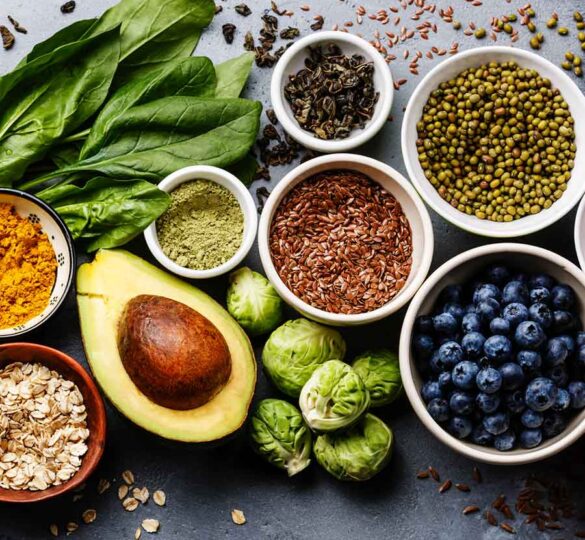Can Diet Affect Glaucoma?
Although no studies prove a connection between specific foods and glaucoma, it’s safe to assume that your diet and your overall health can affect the disease.

Following a healthy diet is beneficial to your overall health. Although no conclusive studies prove a connection between specific foods and glaucoma, and more research is needed to solidify these findings, it’s reasonable to assume that what you eat and drink and your general health affect the disease.
For people living with glaucoma and even those not at high risk for glaucoma, it’s a good idea to follow your doctor’s advice on diet and lifestyle choices that may help protect your eyesight. Continue reading to learn about possible links between diet and glaucoma.
A Healthy Diet May Reduce Your Risk of Glaucoma
In addition to its impact on your overall health, a healthy diet may help reduce your risk of glaucoma. For example, a diet rich in fruits, vegetables, whole grains, and fish has been shown to help lower blood pressure, reducing the risk of glaucoma. Conversely, a poor diet is associated with increased risk factors for glaucoma, like high cholesterol and diabetes. In addition, foods high in saturated or trans fats may increase your risk of developing glaucoma.
Some studies suggest that certain foods and diets can reduce the risk of glaucoma or slow its progression. The following list details food to eat and avoid if you have glaucoma:
Foods Rich in Antioxidants and Phytochemicals
Foods rich in antioxidants and phytochemicals (natural compounds found in plants) — whole grains, berries, leafy greens, and nuts — may help protect against damage from free radicals, which have been linked to an increased risk of eye diseases like glaucoma. However, researchers say further studies are needed to determine if these foods protect against retinal degeneration related to glaucoma.
- Whole grains are rich in fiber, vitamins, and antioxidants.
Whole grains are rich in fiber, vitamins, and antioxidants. Fiber is essential for good health because it helps maintain a healthy digestive system, while vitamins and antioxidants help strengthen the immune system and protect your body from disease. All of these things can also help improve eye health.
- Eating lots of berries could lower your risk for glaucoma by as much as a quarter.
Berries are rich in antioxidants, which can help prevent oxidative stress that contributes to glaucoma. A study published in JAMA Ophthalmology found that eating plenty of berries could lower your risk of developing the disease by as much as a quarter.
Berries such as raspberries, blackberries, and strawberries contain resveratrol, a compound found in red wine that has been linked to lower rates of glaucoma. In addition, blueberries are packed with anthocyanins—pigments responsible for their deep color—which research suggests may protect against cataracts and macular degeneration (another leading cause of vision loss).
- Leafy greens are low in calories and high in nutrients like lutein, which helps your eyes absorb blue light.
In addition to being low in calories and high in nutrients, leafy greens also contain a lot of lutein — an antioxidant that may help prevent macular degeneration, an age-related condition that affects the eyes’ central retina (the part responsible for detailed vision). If you’re not a fan of eating greens on their own, try sneaking them into other recipes: they can be chopped up into salads or sautéed with eggs and bacon.
- Eating more nuts may help slow visual field loss from glaucoma.
Nuts are a good source of vitamin E, magnesium, and arginine, all of which are protective against glaucoma. In addition, nuts are also rich in healthy fats, fiber, and antioxidants that fight oxidative stress on the body’s cells (which can lead to cell damage). Therefore increasing your intake of these nutrients may reduce the risk of glaucoma in the first place!
Studies have also shown that as many as 80% of people with glaucoma who consume an entire quart of water over twenty minutes experience elevated IOP, compared to only 20% of people who don’t have glaucoma.
Some studies have shown that significant caffeine intake over a short time can slightly elevate IOP for one to three hours. However, other studies indicate that caffeine has no meaningful impact on IOP. Therefore, to be safe, people with glaucoma are advised to limit their caffeine intake to moderate levels.
Some studies suggest that denying yourself carbohydrates may slow the growth of glaucoma because it lowers blood sugar levels. Your carbohydrate intake may also play a role in glaucoma risk.
According to a 2020 study, diets with a high carbohydrate intake correlate with a greater risk of glaucoma, while a lower carbohydrate intake correlates with lesser risk. Conversely, in another 2020 study in Nutrients, researchers looked at genetic risk factors for glaucoma. They found that the risk was more significant in patients with high carbohydrate intake vs. lower carbohydrate intake.
However, diet alone is not enough. Lifestyle choices are more important than diet when preventing vision loss due to glaucoma. Eating healthy doesn’t mean you’ll never get sick or injured — but it will help make your body work better, so you can handle those bad days better when and if they come along!
Your Support Can Help Us Find a Cure
While there’s no cure for glaucoma, having regular comprehensive eye examinations to monitor your IOP is one of the ways glaucoma patients can manage their glaucoma. In addition, advancements in glaucoma research continue to bring us closer to finding a cure and restoring vision loss from glaucoma. You can help find a cure with cash, stock, or a vehicle donation. Your support will give hope to those living with glaucoma and accelerate our search for a cure and vision restoration.
Posted on August 31, 2022. Reviewed for medical accuracy by Monica Ertel, MD, PhD.

Monica Ertel, MD, PhD
Monica Ertel, MD, PhD, is an assistant professor of ophthalmology at the University of Colorado Sue Anschutz-Rodgers Eye Center. Dr. Ertel specializes in glaucoma and cataract surgery and currently sees patients in both Denver and Boulder, Colorado.